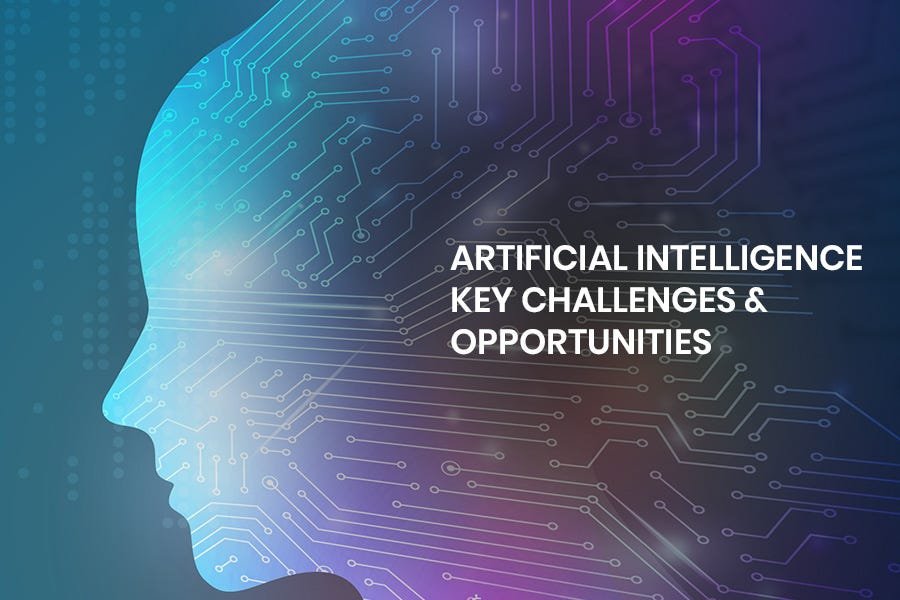Artificial Intelligence (AI) has rapidly evolved, transforming various industries and creating new possibilities. However, the development of AI also presents significant challenges. Understanding these challenges and opportunities is crucial for harnessing AI’s potential while mitigating risks. This article explores the key challenges and opportunities in AI development, providing insights into the future of this transformative technology.

Challenges in AI Development
Ethical and Bias Concerns
AI systems can unintentionally perpetuate or even exacerbate existing biases. These biases often stem from the data used to train AI models. If the data contains historical biases or unrepresentative samples, the AI system may produce skewed results. Addressing these biases requires careful data curation and the development of fair algorithms. Moreover, ethical considerations around privacy and decision-making also need to be addressed to ensure AI is used responsibly.
Data Privacy and Security
AI relies on vast amounts of data to function effectively. This reliance raises significant concerns about data privacy and security. Protecting sensitive information from unauthorized access and breaches is a major challenge. Additionally, ensuring that data is collected and used in compliance with regulations, such as GDPR, is essential. Data anonymization and encryption are critical techniques to safeguard privacy while leveraging AI.
Technical Complexity
The development of AI systems involves intricate technical processes, including algorithm design, model training, and system integration. Managing the complexity of these processes requires specialized skills and expertise. Furthermore, ensuring that AI systems are scalable and maintainable can be challenging. Continuous research and development are necessary to keep up with rapidly advancing technologies and techniques.
Interpretability and Transparency
AI models, especially deep learning algorithms, are often considered “black boxes” because their decision-making processes are not easily interpretable. This lack of transparency can be problematic, particularly in high-stakes areas like healthcare and finance. Developing AI systems that are both accurate and interpretable is crucial for gaining trust and ensuring that decisions can be understood and justified.
Regulatory and Compliance Issues
As AI technology advances, regulatory frameworks are struggling to keep pace. Governments and organizations are working to establish guidelines and standards for AI development and deployment. Navigating these regulatory requirements can be complex and time-consuming. Ensuring compliance with evolving regulations is essential for avoiding legal pitfalls and promoting ethical AI practices.
Opportunities in AI Development
Enhanced Efficiency and Automation
AI offers significant opportunities for improving efficiency and automating tasks across various industries. From manufacturing and logistics to finance and healthcare, AI-driven automation can streamline processes, reduce costs, and enhance productivity. By automating repetitive tasks, organizations can focus on more strategic activities and drive innovation.
Personalized Experiences
AI enables the creation of highly personalized experiences for users. In sectors like e-commerce, entertainment, and healthcare, AI can analyze individual preferences and behaviors to deliver tailored recommendations and solutions. This personalization enhances user satisfaction and engagement, leading to better outcomes and increased loyalty.
Advances in Healthcare
AI has the potential to revolutionize healthcare by improving diagnostics, treatment planning, and patient care. Machine learning algorithms can analyze medical images, predict disease outcomes, and assist in drug discovery. These advancements can lead to earlier diagnoses, more accurate treatments, and ultimately, better patient outcomes.
Innovation in Research and Development
AI is driving innovation in research and development across various fields. It accelerates the discovery of new materials, enhances scientific research, and supports creative endeavors. For instance, AI can analyze vast datasets to identify patterns and generate new hypotheses, leading to breakthroughs in fields such as materials science, environmental studies, and drug development.
Improved Decision-Making
AI can support more informed and data-driven decision-making processes. By analyzing large volumes of data and providing actionable insights, AI systems can help organizations make better strategic choices. This capability is valuable in areas such as financial forecasting, supply chain management, and risk assessment.
Conclusion
AI development presents both challenges and opportunities. While ethical concerns, data privacy, technical complexity, interpretability, and regulatory issues pose significant obstacles, AI also offers transformative potential. Enhanced efficiency, personalized experiences, advances in healthcare, innovation in research, and improved decision-making are among the many benefits AI can deliver. Addressing the challenges while seizing the opportunities will be key to advancing AI technology and realizing its full potential for society.
